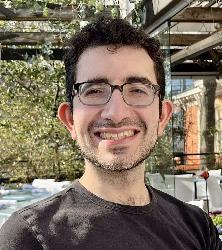Psychology Faculty

- Pronouns he, him, his, his, himself
- Title
- Assistant Professor
- Division Social Sciences Division
- Department
- Psychology Department
- Affiliations Global & Community Health
- Website
- Office Location
- Social Sciences 2, Room 374
- Office Hours (Winter 2024) Wednesday, 2pm - 3pm In person Soc Sci 2 via Zoom (by appointment) https://ucsc.zoom.us/j/2614399607?pwd=dVhDd1NzV0RUZVNHT2thZ3NBN1pNZz09 Meeting ID: 261 439 9607 Passcode: StressUCSC
- Mail Stop Psychology Faculty Services
- Faculty Areas of Expertise Health and Wellness, Child and Adolescent Development
- Courses PSYC109 Stress & Wellbeing, PSYC244B Proseminar II: Social and Personality Development
Research Interests
Research within Dr. Rahal's lab is focused on understanding the daily experiences of racially and socioeconomically diverse youth throughout development. Projects are unified by the focus on understanding how marginalization can negatively impact youth health and development. Marginalization refers to the dynamic processes by which certain groups are systematically disadvantaged, and in my work I tend to focus on cultural stressors including discrimination as well as feeling of lower status. Specifically, youth receive messages regularly throughout development from peers, new outlets, and societal systems that can cause them to feel undervalued or disrespected because of their social identities, and these feelings can negatively impact well-being.
One area of particular interest in stress process, including affective and physiological responses daily and acute threat. Marginalization may prime stress response systems, and over time repeated activation can wear down bodily systems to undermine health. During adolescence, when psychobiological systems are developing and youth are experiencing newfound interpersonal and academic stressors, stress processes may be particularly tied to health and may be setting the stage for poorer health later in development. Projects examine varied psychobiological systems (e.g., HPA-axis, immune system, autonomic nervous system) and responses to acute paradigms within the lab, day-to-day experiences such as arguments or demands that people regularly encounter in daily life, and real-world acute stressors such as class exams or political news.
Biography, Education and Training
Danny Rahal is an Assistant Professor in the Psychology Department and an affiliate of the interdisciplinary Global and Community Health Program. Dr. Rahal completed his undergraduate training at the University of North Carolina at Chapel Hill in psychology and biochemistry under the mentorship of Drs. Beth Kurtz-Costes and Vanessa Volpe (currently at NC State University). He received additional training from Dr. Stephen Porges’ lab, primarily under Dr. Greg Lewis. Dr. Rahal then completed his doctorate in developmental psychology at the University of California, Los Angeles under the mentorship of Drs. Andrew Fuligni and Theodore Robles with support from a NIDA NRSA F31, and then completed his postdoctoral training at The Pennsylvania State University as part of the Prevention and Methodology Training Program. His research is broadly focused on understanding the daily experiences of racially and socioeconomically diverse youth throughout development. He employs psychobiological measures to examine how marginalization, with respect to being treated as and feeling of lower status, can negatively impact on health, with a focus on alterations in stress processes as one pathway.
Selected Publications
Rahal, D., & Singh, A. (In Press). Racial discrimination moderates associations between sociopolitical discussions and well-being among racial minority college students. Cultural Development & Ethnic Minority Psychology.
Rahal, D., Tashjian, S. M., Karan, M., Eisenberger, N., Galván, A., Fuligni, A. J., Hastings, P. D., & Cole, S. W. (In Press). Positive and negative emotion are associated with generalized transcriptional activation in immune cells. Psychoneuroendocrinology.
Rahal, D., Chiang, J. J., Huynh, V. W., Bower, J. E., McCreath, H., & Fuligni, A. J. (In Press). Subjective social status and daily eating behavior in late adolescence. Appetite.
Rahal, D., Shaw, S. T., & Stigler, J. W. (In Press). Lower socioeconomic status is related to poorer emotional well-being prior to academic exams. Anxiety, Stress, & Coping. https://doi.org/10.1080/10615806.2022.2110588
Rahal, D., Shirtcliff, E. A., Fuligni, A. J., Kogut, K., Gonzales, N., Johnson, M., Eskenazi, B., Deardorff, J. (In Press). Dampened psychobiological responses to stress and substance use in adolescence. Development & Psychopathology. https://doi.org/10.1017/S0954579422000244
Rahal, D., Fales, M., Haselton, M. G., Slavich, G. M., & Robles, T. F. (In Press). Cues of social status: Associations between attractiveness, dominance, and status. Evolutionary Psychology. https://doi.org/10.1177/14747049211056160
Rahal, D., & Kurtz-Costes, B. (In Press). Mistreatment and visibility among Arab Americans. Psychology of Religion & Spirituality. https://psycnet.apa.org/doi/10.1037/rel0000432
Rahal, D., Alkon, A., Shirtcliff, E. A., Johnson, M., Gonzales, N., Fuligni, A. J., Kogut, K., Eskenazi, B., & Deardorff, J. (2023). Substance use and autonomic nervous system responses to stress in adolescence. Stress & Health, 39(1), 182-196. https://doi.org/10.1002/smi.3173
Rahal, D., Bower, J. E., Irwin, M. R., Fuligni, A. J., & Chiang, J. J. (2023). Resting respiratory sinus arrhythmia is related to greater emotion reactivity to social-evaluative threat. Journal of Affective Disorders, 320, 725-734. https://doi.org/10.1016/j.jad.2022.09.100
